I recently had the pleasure of exploring Portugal’s captivating Alentejo region as a guest of the CVRA, Alentejo’s Regional Winegrowing Commission. Join me as I share my daily adventures in a series of blog posts. I hope you’ll enjoy the journey!
On the third day of our press trip, we had the delightful opportunity to explore three charming boutique producers nestled within the picturesque small villages of Vila Alva (pop. ~500) and Vila de Frades (pop. ~900)
In small villages like these and other nearby villages, the tradition of crafting traditional talha wines has been woven into the cultural fabric for centuries, tracing back to the era of the Romans over two millennia ago. Passed down from generation to generation, the intricate knowledge of talha winemaking (see video below) has endured, ensuring its continued practice in these villages and beyond to this very day.
These villages, once home to a dwindling number of talha producers who were hanging on my a thread, are now bustling hubs of activity, breathing new life into this ancient craft.
The video above mentions Feast of St. Martin’s (São Martinho Day) which holds a special significance in Alentejo. It marks the moment when wines aged in talhas, traditional clay vessels, are deemed ready to be savored with friends and family. It symbolizes the culmination of months of careful aging and anticipation, as winemakers eagerly await this pivotal day.
During the traditional ritual, the winemaker gently inserts a wooden tap into the bunghole at the base of the talha, facilitating the unhurried flow of wine into strategically positioned bowls, or even directly into small tumblers or pitchers, allowing loved ones to savor the fruits of their labor in its purest form.
Moreover, for producers seeking to craft and bottle wines classified as Vinho de Talha DOC, this day also serves as a crucial milestone. It is on St. Martin’s Day that these wines aged in talhas may first be prepared for bottling, ensuring that they meet the rigorous standards of this esteemed designation.
St. Martin’s Day embodies the essence of Alentejo’s winemaking traditions, celebrating both the heritage and the future of this storied region.
XXVI Talhas
Our day began with a visit to XXVI Talhas situated in a modest residential neighborhood in Vila Alva.
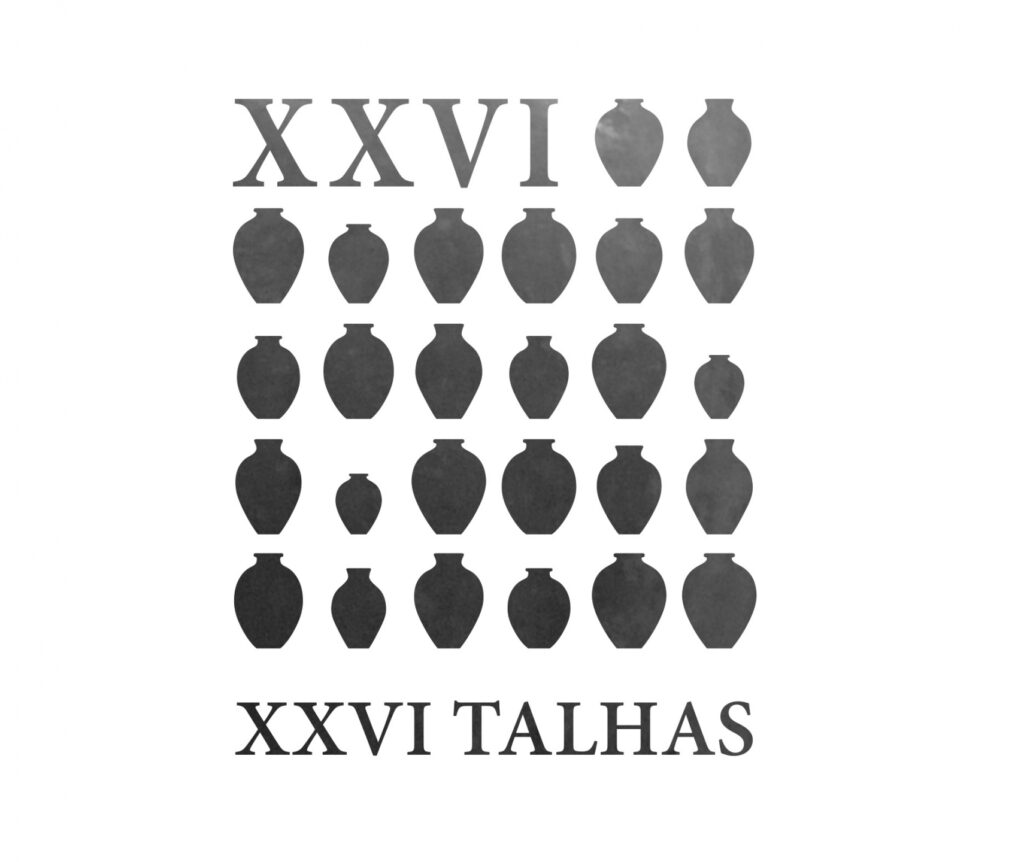
XXVI Talhas was established by a tight-knit circle of friends, all born and raised in Vila Alva, united by a shared love for their hometown’s heritage and profound passion for preserving the time-honored craft of talha winemaking. Their project is the realization of a longstanding dream—an endeavor dedicated to honoring and showcasing the unique Talha wines crafted in Vila Alva.
The wines of XXVI Talhas are crafted at Adega do Mestre Daniel , paying homage to one of the co-founders, Daniel Parreira’s grandfather, Daniel Antonio Tabaquinho dos Santos (1923-1985). Locally known as Mestre Daniel for his expertise as a carpenter, he not only crafted talha wines but also utilized the wine cellar (“Adega”) for his carpentry work.
Mestre Daniel dedicated roughly 30 years to producing talha wine, faithfully carrying on the cherished family tradition passed down from his parents and grandparents. Following his passing, production continued for a some years before ceasing altogether in the 1990. The winery derives its name from the 26 talhas adorning the walls of the space, empty and unused before its restoration.
In 2018, after a hiatus of nearly three decades, the winery experienced a revival, thanks to the dedicated efforts of Mestre Daniel’s grandchildren and friends. Their commitment reignited the cherished local and familial legacy of talha wine production, bringing the age-old tradition back to life once more.
It was at XXVI Talhas, amidst the ongoing celebration of St. Martin’s Day, that friends and family convened at Adega de Mestre Daniel to indulge in freshly tapped talha wines, both white (“vinho branco”) and red (“vinho tinto”) alongside a delectable spread of food brought by family and friends to be shared.
Here, I experienced the unique pleasure of tasting talha wine straight from the freshly disgorged talhas for the very first time!
The vinho branco, a blend of indigenous grape varieties, was a delicate pale golden hue with crisp and very refreshing apple, citrus, wet clay character that showed appealing hint of tannins. The vinho tinto, also a blend of indigenous grape varieties, was a ruby color. It’s light on its feet with bright acidity, dusty tannins with a mixed dried and ripe red fruit aromas and flavors accented with damp clay and subtle spice notes. I found both wines to be delightfully “rustic” in the best sense of the term – offering easy-drinking, and refreshing qualities that pair beautifully with the flavors of local cuisine.
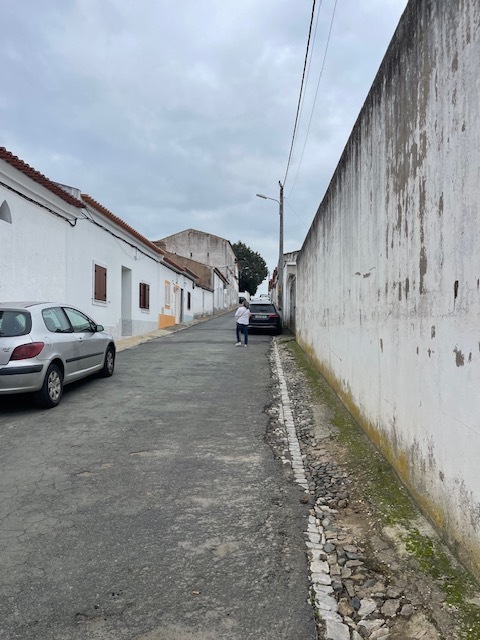
A street adjacent to Adega Mestre Daniel and XXVI Talhas 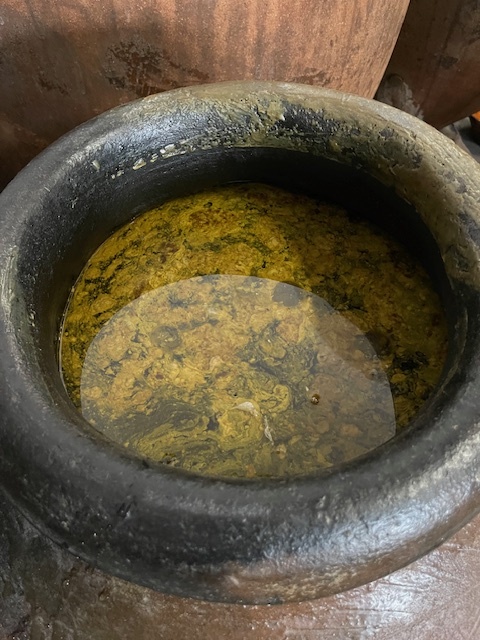
Once fermentation is complete the talha is sealed from air with a thin layer of olive oil 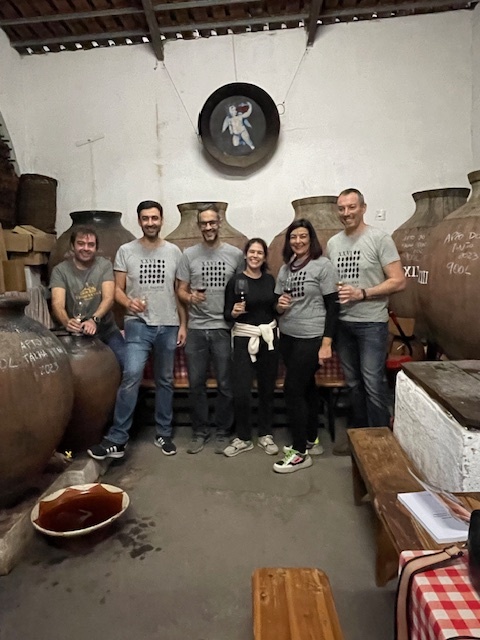
The team of XXVI Talhas 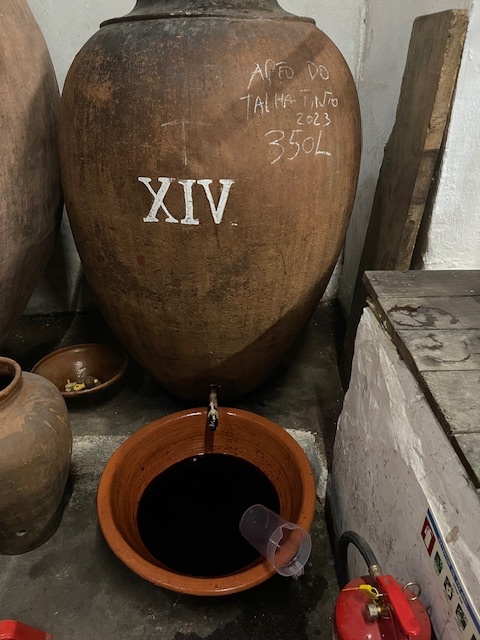
2023 Vinho Tinto (red wine) being drained from talha an alguidar 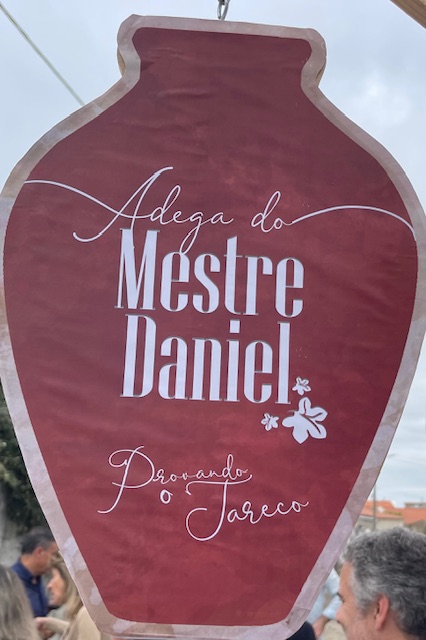
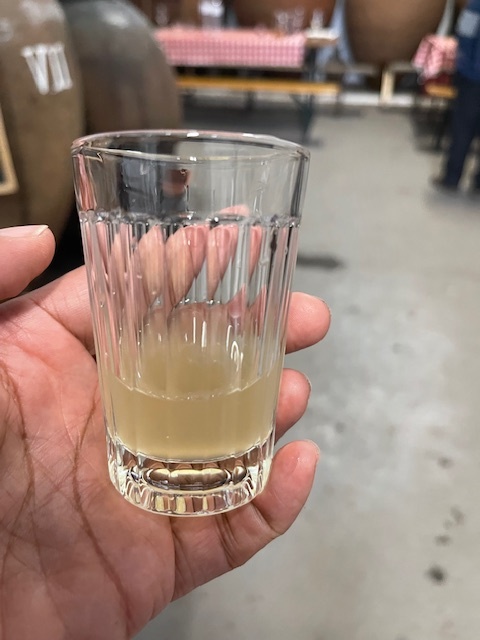
A sample of 2023 Vinho Branco (white wine) straight from the Talha! What a treat!
Indulging in these freshly poured talha wines, crafted in the purest and most natural manner possible, was an incredibly satisfying experience. Making wines in talhas allows the true essence of the grapes to shine through, captivating the senses with their authentic flavors and vibrant character.
It’s fascinating to note that at the heart of traditional talha culture, the emphasis lies not on commercial gain, but on communal sharing – where winemaker’s adegas are transformed into ad hoc wine bars and anyone is welcome to stop by for a glass or two (see photo above for the small stemless tumblers used for tasting). And, the local custom when visiting a friends cellar is to bring something tasty to share, further enhancing the sense of camaraderie and conviviality.
These traditions encapsulate the very heart of community, embodying values of generosity and the sheer joy of gathering together to celebrate life’s simple pleasures. In quaint Alentejano villages like Vila Frades, each sip isn’t merely a taste; it’s a profound journey through the annals of time and cherished heritage.
Talha Wines vs. Vinho de Talha DOC Wines
I want to draw your attention to the important distinction between “Talha Wine” and Vinho de Talha DOC wines.
- Talha Wine: Talha wine refers to wine made using traditional clay vessels called talhas for fermentation and aging. These vessels have been used for centuries in regions like Alentejo, Portugal. Talha wine production typically follows ancient methods, with minimal intervention and natural fermentation. Talha wine may not necessarily adhere to specific regulatory standards or classifications. These wines may or may not be bottled (e.g. XXVI Talha serves talha wines directly from freshly tapped talha and, they also make Vinho de Talha DOC bottled wines).
- Vinho de Talha DOC: Vinho de Talha DOC (Denominação de Origem Controlada) is a regulated appellation for wines produced in the Alentejo region of Portugal using talha clay vessels. These wines must adhere to strict production regulations set forth by the governing body, including grape varietals allowed, vineyard practices, winemaking techniques, and aging requirements. Vinho de Talha DOC wines are subject to quality control measures and are granted a specific designation based on their adherence to these standards.
Talha Mafia
What started as a hobby among a tight-knit circle of friends, driven by a curiosity that surpassed that of typical wine enthusiasts, evolved into the establishment of Talha Mafia in the village of Vila Frades in 2020. Their inaugural release was the 2021 Revolver.
Our philosophy is an expression of simplicity. We live in a world still challenged by excess. Our mission is all about restraint. Restraint in intervening; from the use of resources, processes and packaging; we let the raw, natural beauty of our star ingredients (grapes) shine.
Talha Mafia website
They source indigenous local grapes from their esteemed neighbors in Vila Frades, ensuring the authenticity and character of their wines while proudly honoring the rich heritage of talha wines in the region.
They possess 12 ancient talhas that are hundreds of years old. Towering over 2 meters tall and capable of holding over 1000 liters of wine, these talhas stand as monuments to tradition and craftsmanship. Firmly believing in the distinct influence of each talha on their wines, they have honored this belief by assigning a popular Roman woman’s name to each vessel.
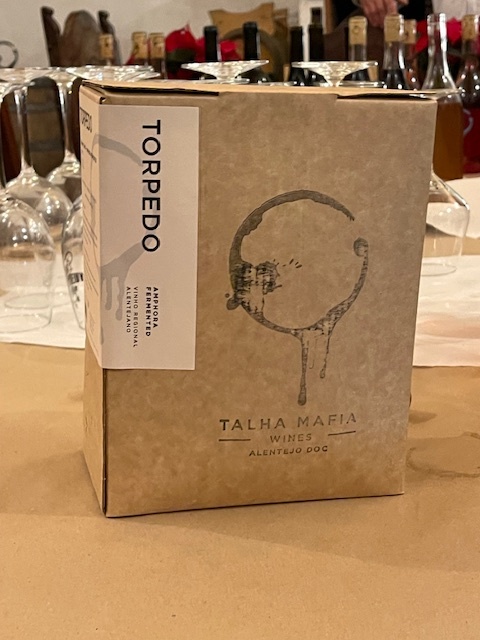
Talha Mafia was the first to put talha fermented wine in the bag in a box format 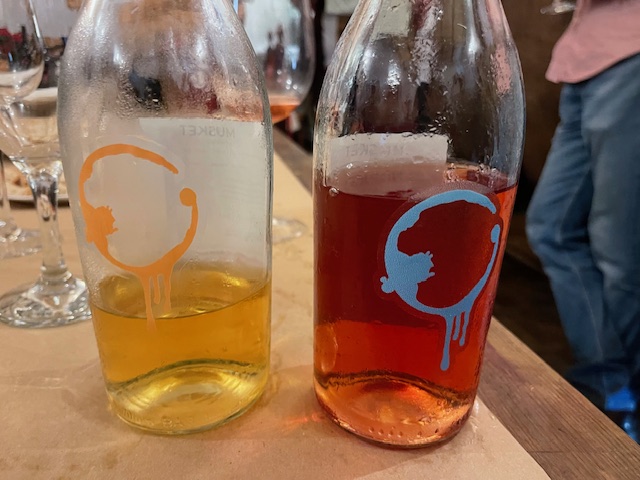
2022 Musket Branco and 2022 Musket Rosé 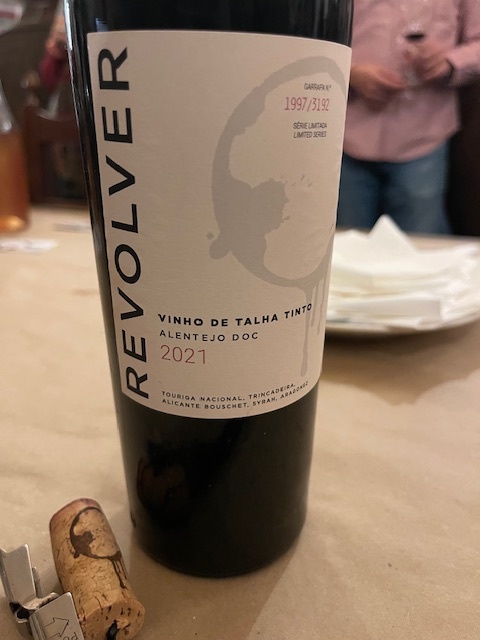
2021 Revolver 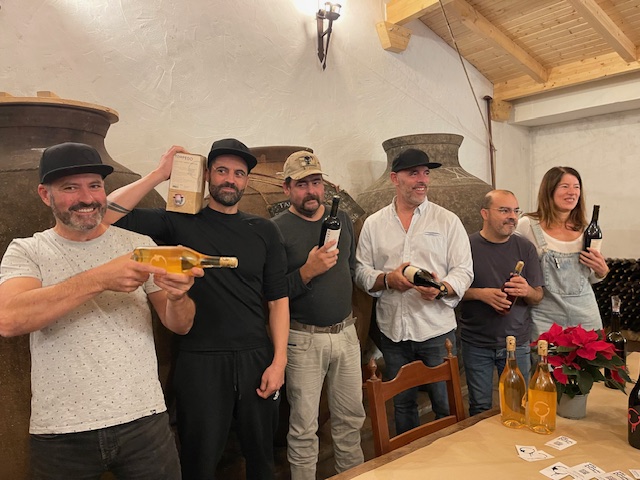
The group of 6 family and friends who co-founded Talha Mafia
My favorite wines tasted were:
2022 Musket White – This skin fermented white (a.k.a. “orange”) wine is a blend of Antao Vaz, Roupeiro and Viosinho grapes that were fermented on native yeast and aged in talhas for 8 months before being bottled unfiltered with mininmal sulfites. It’s pale lemon color with ripe cantaloupe, apricot, and pineapple aromas, complemented by a subtle undertone of apple cider. On the palate, its flavors echo its aromas delivering a delightful interplay of juicy acidity and a gentle hint of tannins. 88pts
2021 Revolver – a blend of Touriga Nacional, Alicante Bouschet, Aragonez, Syrah and Trincadeira each fermented in separate talhas on native yeast and aged for 6 months before being blended and bottled unfiltered. Enticing aromas of blackberry, red currant, boysenberry, spice and dried savory herbs. On the palate, it’s medium-bodied with vibrant acidity and firm tannins with flavors that echo its aromas with a very satisfying finish. 91pts
Talha Mafia is making Vinha de Talha wines fun, but don’t mistake ” fun” with frivolity—this winery takes its craft seriously. With a focus on natural winemaking practices, they meticulously craft each wine to reflect the purity of the terroir while upholding their commitment to sustainability. Utilizing recycled materials and lightweight wine bottles, they minimize their environmental footprint and contribute positively to the planet. As proud members of One Percent for the Planet, an esteemed international organization, they exemplify their dedication to environmental preservation by donating a portion of their annual revenue to worthy causes aimed at safeguarding our precious ecosystems. Plus, the wines are delicious and refreshing across board. I call that a win-win!
Honrado Vineyards
Honrado Vineyards stands as a testament to family tradition, operating as a multifaceted establishment encompassing a winery/vineyard, restaurant, and wine cellar museum. When Ruben Honrado joined his father António in the family company, which boasts a legacy of several generations crafting talha wine, he embarked on a mission to certify and bottle wines that were previously exclusively served at their renowned restaurant, País das Uva, which serves authentic Alentejano cuisine. All their wines are classified as Vinho de Talha DOC. Guiding their winemaking endeavors is the expertise of acclaimed consultant Paulo Loreano.
With Ruben as our host, we enjoyed a fabulous dinner in the wine cellar/museum that included a inspired performance of Alentejano music that added a harmonious note to a most memorable experience.
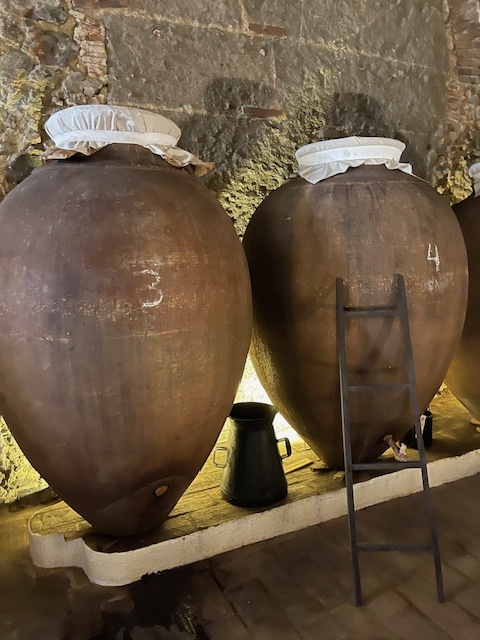
Active talhas inside Honrado’s wine cellar/museum 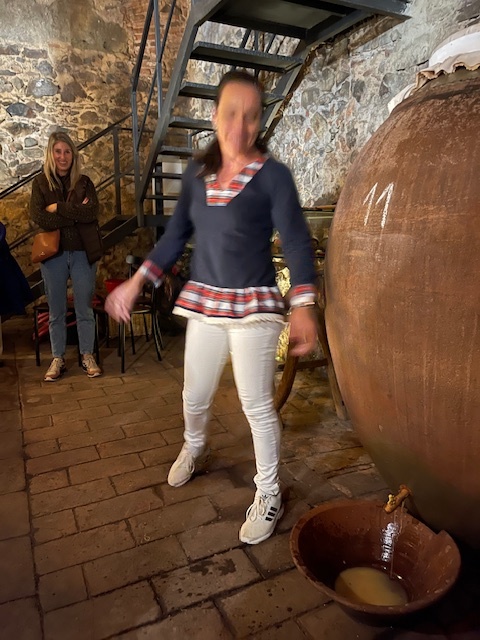
We witnessed a bit of history – the first women to tap a talha at Honrado! 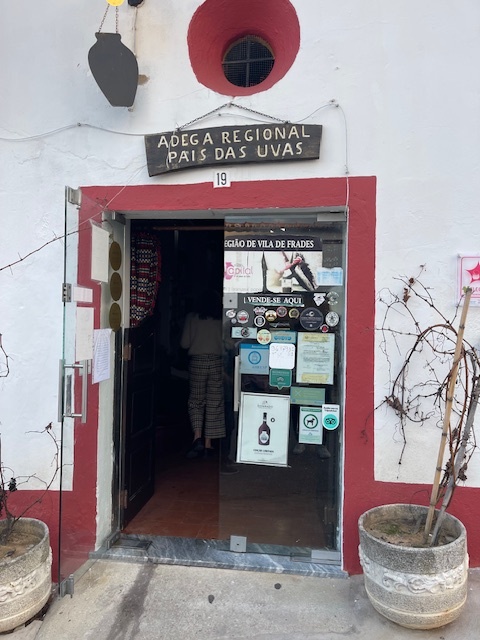
The entrace to País das Uva adjacent to the wine cellar/museum 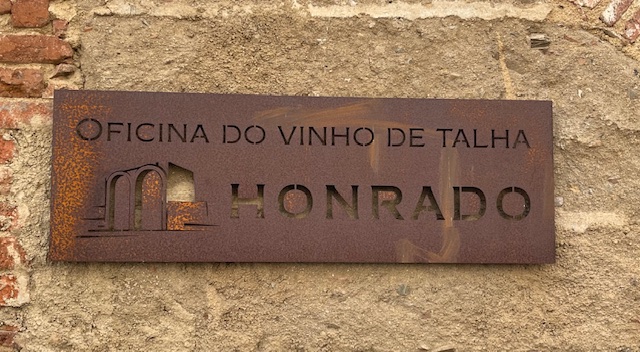
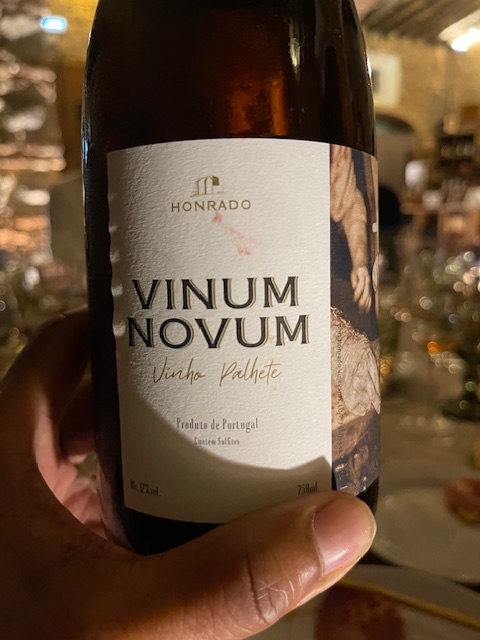
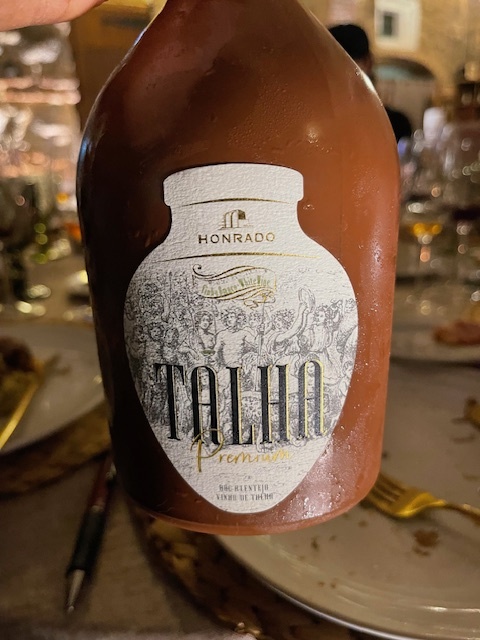
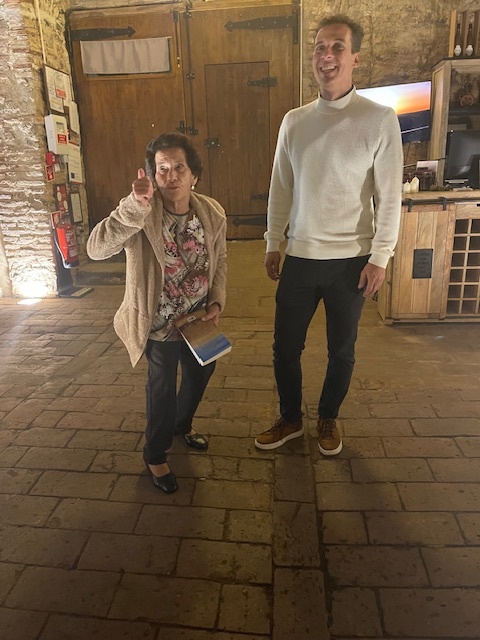
Our host Ruben Honrado and our guest of honor for the evening his grandmother!
My favorite wines tasted were:
2023 Vinum Novum Palhete – This wine is released every year on Saint Martin’s Day (11th of November). The term “palhete” refers to a light bodied red made from both red and white grapes. In this case, the wine is a field blend consisting of 95% white grape varieties, including Antão Vaz, Arinto, and Viosinho, complemented by 5% of the red grape variety Trincadeira. The grapes were harvested in August and bottled in November of the same year. It has a very refreshing red apple, white peach, strawberry character accented with a bit of minerality. It’s a great example of wine that is bottled rather than served from the talha. 88pts
2018 Honrado Vinho de Talha Premium Branca – This is a limited production wine sourced from a single talha deemed to the best. Therefore it’s a single batch, numbered and its production limited to the capacity of the talha. It is a blend of equal parts of Antão Vaz, Arinto, Perrum and Diagalves in contact with skins for 4 months. It a pretty amber/orange color with dry, very refreshing and tangy dried apricot, orange marmalade, pink grapefruit, wet clay character and subtle tannins It’s very food friendly with a very satisfying finish. 90pts
2021 Honrado Vinho de Talha Premium Tinto – This is a limited production wine sourced from a single talha deemed to the best. Therefore it’s a single batch, numbered and its production limited to the capacity of the talha. It’s a blend of Alfrocheiro, Aragonez, Trincadeira and Alicante Bouschet in contact with skins for 4 months. It’s a medium crimson color with an enticing and refreshing black cherry, plum, dried blackberry and chocolate character accented with appealing peppery notes. 91pts
Our experience at Honrado Vineyards epitomized the deep sense of pride, community, and hospitality that characterizes the spirit of Alentejo.
As the sun set on our journey through the enchanting villages of Vila Alva and Vila de Frades, I couldn’t help but reflect on the memorable experiences shared at XXVI Talhas, Talha Mafia and Honrado Vineyards. From the rustic allure of their surroundings to the deep-rooted passion for preserving millenary talha winemaking traditions, each visit provided a window into the vibrant tapestry of heritage and innovation woven into the very fabric of these charming communities.
Thirsty for more? I invite you to explore my additional articles on Alentejo for a deeper dive into this enchanting wine region:
- Alentejo Chronicles: Day 2; São Martinho and Friends – Adega Nautus Vini + World Amphora Day
- Alentejo Chronicles: Day 1 – Évora and Herdade Fitapreta
- Enchanting Alentejo: A Wine Lover’s Paradise
- Rediscovering Alentejo; A Journey Back
- Alentejo On My Mind; Part 1-Sustainability
- Alentejo On My Mind; Part 2 – Exploring The Wines of Alentejo
Fascinating…and so glad to see that there’s a strong future for talha winemaking!